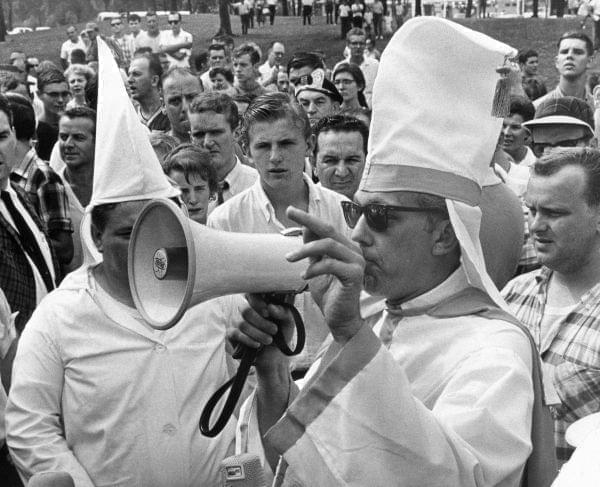SPLC Finds 21 Active Hate Groups In Illinois

Man clad in Ku Klux Klan type robes uses bullhorn to address crowd in Marquette Park, Chicago on August 21, 1966 following rally staged by American Nazi Party. He was arrested for speaking without a permit and identified himself as Evan Lewis, 34, of Akron, Ohio. Park was scene of violent racial clashes earlier this summer. (AP Photo/Charles E. Knoblock)
Last month’s shooting at an African American church in Charleston, South Carolina has focused the nation's attention on hate crimes after Dylann Roof, the alleged gunman, reportedly wanted to start a race war.
Research from the Southern Poverty Law Center (SPLC) shows that Illinois has the second largest number of hate groups in the Midwest. Behind Ohio (27), Illinois has twenty-one active hate groups as of 2014.
Senior Fellow at the SPLC Mark Potok spoke with Illinois Public Media's Tiffany Jolley about the history of hate groups in Illinois and why he doesn't believe that Illinois is an outlier.
"These groups by and large tend to follow population. If you look at Kansas, Kansas only has 3 groups, as you said, Ohio has 27, California has in the 50s and so on," said Potok.
Additionally, Potok notes that cultural conflicts from within the state play a role in the formation of hate groups.
"In the case of Illinois we have a variety of different kinds of these groups, some of them in fact are black supremacist groups like the Nation of Islam that tend to be urban as opposed to Klan groups, which we find almost exclusively in rural areas.
"I think that Illinois has some cultural conflicts like many states do between the big cities like Chicago and the country, so that accounts for a little bit of it, but again I wouldn’t pick out Illinois as some hotbed of hatred, I don’t think that’s true, but you certainly do have your fair share of groups," said Potok.
The SPLC counted 784 active hate groups in the United States in 2014. Hate groups are defined by the SPLC by the beliefs or practices that attack or malign an entire class of people, typically for their immutable characteristics.
The SPLC compiled their annual list of hate groups by monitoring hate group publications, websites, citizen and law enforcement reports, field sources and news reports.
Hate group activities can include criminal acts, marches, rallies, speeches, meetings, leafleting or publishing. Websites appearing to be merely the work of a single individual, rather than the publication of a group, are not included in the annual report of hate groups.
According to SPLC archives, The Creativity Movement (formerly known as the Church of the Creator), a group based in East Peoria, has been active in Illinois since 1973.
The SPLC describes the Creativity Movement as a self-styled religious organization. The Creativity Movement incessantly promotes what it sees as the inherent superiority and "creativity" of the white race — about the only tenets there are to its
supposed "theology." In addition to the Creativity Movement, several chapters of the Nation of Islam, a black separatist hate group founded in 1930 are organized in Peoria, Rockford, Chicago and East Saint Louis. The Nation of Islam, based in
Chicago, has grown into one of the wealthiest and best-known organizations in black America. The SPLC describes the ideology of the hate group as deeply racist, anti-Semitic and anti-gay based on the innate black superiority over whites.
Potok says he and other experts look to preliminary indicators such as economics and political shifts to predict whether the number of hate groups will increase or decrease over a given period of time.
"We've seen a steady rise in hate groups since the end of the 1990s, at about bewteen 4% and 6% a year," said Potok, "But there was an incredible growth over four years between 2008 and 2012, with the campaign and election of Barack Obama, our nation's first black president, and the economy crashing in the same year."
Despite the tragedies of hate crimes like the shooting at Mother Emanuel in Charleston, South Carolina, Potok says the United States is in a moment of transition.
"It's hard to predict the future, but my own feeling about that is that we are headed for a better place, but we’re living through difficult times as the nation adjusts to this very big change. And even now looking at all of the attacks on the confederatebattle flag in South Carolina, all of that is very important. There's a lot of change happening in this country, and I think it’s worth thinking about that there have been backlashes against most every progressive change in our society, yet I think at the end of those backlashes we’ve turned into a better country," said Potok.

